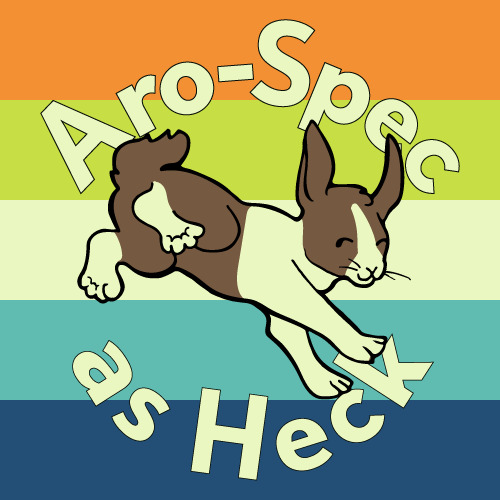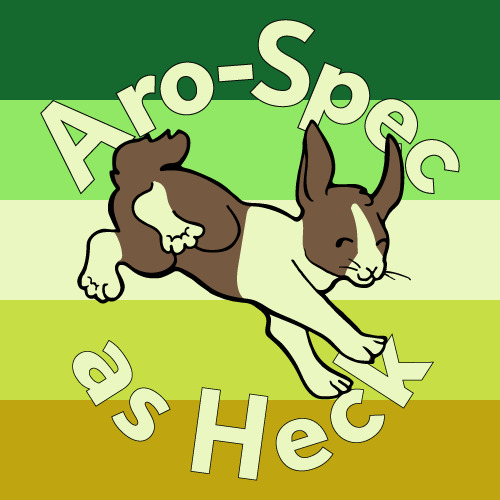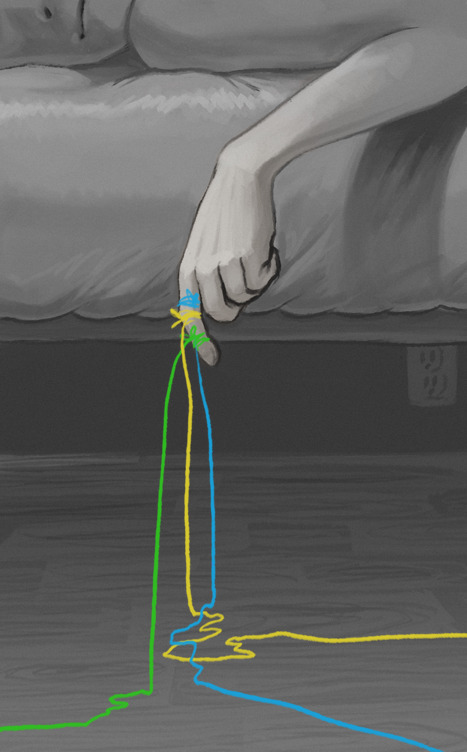Hi! You can call me fairy or aro! This blog is fairy-themed! Please read my pinned post before following! Icon ID: the aro flag but softer colors. Banner ID: the aro flag but the white stripe is taller and it has the wheelchair disabled symbol in the middle.Pronouns: he/it/aro/feather/fairy
Don't wanna be here? Send us removal request.
Note
Aroallo people, is being aromantic and allosexual more important then your other queer identitys?
Yes, being aroallo is more important to me then my other identity's
No, its equal to my other identity's
No, a different identity is more important to me
My only queer identity is being aroallo
Not aroallo/see results
#💚🤍🖤#aro polls#aroallo is the most important for me to state because its how i organize relationships#how i move through them#bisexual is secondary
21 notes
·
View notes
Note
aros, if you're on any other anattractional spectrums beside aromantic, which ones are you on?
asexual spec
aplatonic spec
afamilial spec
anaesthetic spec
anemotional spec
asensual spec
analterous spec
other
multiple of the above (say in tags!)
not applicable
44 notes
·
View notes
Note
Hi!
Arospecs, are you non-partnering*?
Yes
Mostly, but there's wiggle room
No, I am open to QPRs or other non-rom relationships
No, I am open to romantic relationships as well
See results
*having no desire to participate in a committed relationship, this could be romantic, queerplatonic, sexual, or your own definition
*having no desire to participate in a committed relationship, this could be romantic, queerplatonic, sexual, or your own definition
48 notes
·
View notes
Text
the white-green gradient of a freshly chopped spring onion…. c'est magnifique
110K notes
·
View notes
Text










aromantic agender wallpapers!
requested by anon
Aromantic: Someone who experiences little to no romantic attraction; Has no desire or urge to be in or seek out a romantic relationship; An umbrella term for people who identify with part of the aromantic spectrum. Commonly abbreviated to aro
Agender: Someone who doesn't feel any gender; Genderless
162 notes
·
View notes
Note
hi! i've never submitted a poll before, so i hope this is the right format ^^
"aromantics/arospecs, do you think you would ever marry someone? this could be for convenience, keeping up an appearance, financial reasons, for fun, etc."
yes, in a non-romantic way
yes, in a romantic way
maybe, in a non-romantic way
maybe, in a romantic way
no, in neither way
i am already married in a non-romantic way
i am already married in a romantic way
it's complicated
see results/non arospec
thanks for submitting anon <3
#💚🤍🖤#aro polls#i plan on legally marrying my gf as she needs to stay outside of her home country without being deported#i plan on doing wedding ceremonies (not legal#just a huge party) withr my other partners to celebrate our love
81 notes
·
View notes
Text
im feeling down that i don’t know any other aroallo people rb if you’re also aroallo
340 notes
·
View notes
Text
More offline aro spaces would improve the quality of our discussions the the support we can give each other immensely. Maybe we should all get into zines and start an international aro zine circle, start trying to meet up with local aros, make plans to bring an aro contingent to next year's pride, make an aro book club... there are so many possibilities and I think we're limited by how online our community is.
1K notes
·
View notes
Text
'maybe my story is too aromantic and no one will get it-' good. confuse allos
2K notes
·
View notes
Text
everything sucks so bad. but at least there's aromanticism.
4K notes
·
View notes
Text
The way I see this phenomenon very often in shared spaces where an aroallo will be assumed hostile before they are given leeway to have anything of worth to say or comment on. It gets exhausting living on the defensive where even one ambiguous word can get you called animalistic and whatever other aroallophobic insult comes to mind, or get you completely dismissed forever as an agitator.
I mourn when the aroallo voice is reduced to the voice of an aggressor; I don't have to wonder or guess on what part of the aroallo identity leads to this assumption and perception. The trend speaks for itself.
25 notes
·
View notes
Photo




Hey I love you! Since my buns were so well received last year, I’m rereleasing them at a larger size. Show off your Aromantic Spectrum Pride with a rabbit, convenient for this year of the rabbit too!
[ID Start: Four icons of various aromantic spectrum identities’ flags all with “aro-spec as heck” curving around a binkying dark brown dutch rabbit. First is the Aro-spec flag: green, light green, off-white, light navy, navy. Second is Aro Ace; orange, yellow, white, light blue, blue. Third is Allo Aro; green, light green, white, light yellow, yellow. Fourth is the Aromantic flag: dark green, light green, white, grey, black. /End ID.]
Free to use! No need to credit but you can if you want. More to come throughout ASAW 2023.
757 notes
·
View notes
Note
Can you do just an Aro one? I love these sm!!


[Image ID: two wallpapers styled after the aromantic flag. One is a pattern of colorful swirls and the other is in the pattern of speckly dappled stripes. End ID.]
84 notes
·
View notes
Note
similar to the alloace poll, would also prefer it to not include see results
Aromantic Allosexuals, what is your sexual orientation?
Lesbian/WLW/NBLW
Gay/MLM/NBLM
Bisexual
Pansexual
Some other sexual orientation
I use multiple of the above
Unsure/Questioning
Unlabeled, I just use allosexual
22 notes
·
View notes
Text
the issue with shipping aro/ace characters isn't putting them into relationships, it's the fact that no one adds how their sexuality impacts the relationship at large. And how it'll always be different from your average romantic relationship in some way.
8K notes
·
View notes
Text
Shout out to all aromantics that can't tell if they experience romantic attraction or not.
328 notes
·
View notes
Photo

some people say there’s a red string that connects fated lovers
328K notes
·
View notes